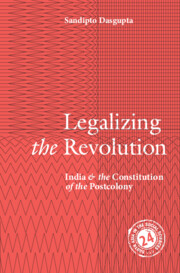Book contents
Introduction: Decolonization and Constitution
Published online by Cambridge University Press: 07 May 2024
Summary
If the world is to be lived in, it must be founded.
—Mircea Eliade, The Profane and the SacredWhy is the originality so readily granted us in literature, so mistrustfully denied us in our difficult attempts at social change?
—Gabriel Garcia Marquez, Nobel Lecture, 1982Standing on this sword's edge of the present between the mighty past and the mightier future, I tremble a little and feel overwhelmed by this task.
—Jawaharlal Nehru, Constitutional Assembly Debates,13 December 1946After the image comes the institution. Images of freedom, in their splendid multiplicity, had been articulated and organized since the beginning of the century. By mid-century, despite the best attempts of imperial regimes, they became impossible to ignore. So, the end of the Second World War began a two-decade-long process whereby nearly half of the world's population liberated itself from formal colonial domination. Now came the time to realize the free futures that had thus far only been imagined: to constitute the postcolony. Speaking at one of the early meetings of the Indian Constituent Assembly on the eve of the country's formal independence, Jawaharlal Nehru said, ‘Words are magic things often enough but even the magic of words sometimes cannot convey the magic of the human spirit and of a Nation's passion.’
The moment of postcolonial transition called for translating the suppressed aspirations of the long anticolonial decades into concrete, tangible, words – words that would construct the institutional architecture of the liberated postcolony: the constitution, which, Nehru said, ‘feebly seeks to tell the world of what we have thought or dreamt of for so long, and what we now hope to achieve in the near future’. The language of India's first prime minister, mixing the soaring with the halting, captured the dynamic of hopes and anxieties, dreams and disquiets that marked the postcolonial institutional moment.
We are a long way from those dreams, and even the disquiets are now set to a different register. While a much-discussed term again, decolonization today is thought of mainly as a discursive and epistemic project. The discursive has always been a crucial ground on which anticolonial resistance was mobilized.
- Type
- Chapter
- Information
- Legalizing the RevolutionIndia and the Constitution of the Postcolony, pp. 1 - 42Publisher: Cambridge University PressPrint publication year: 2024

